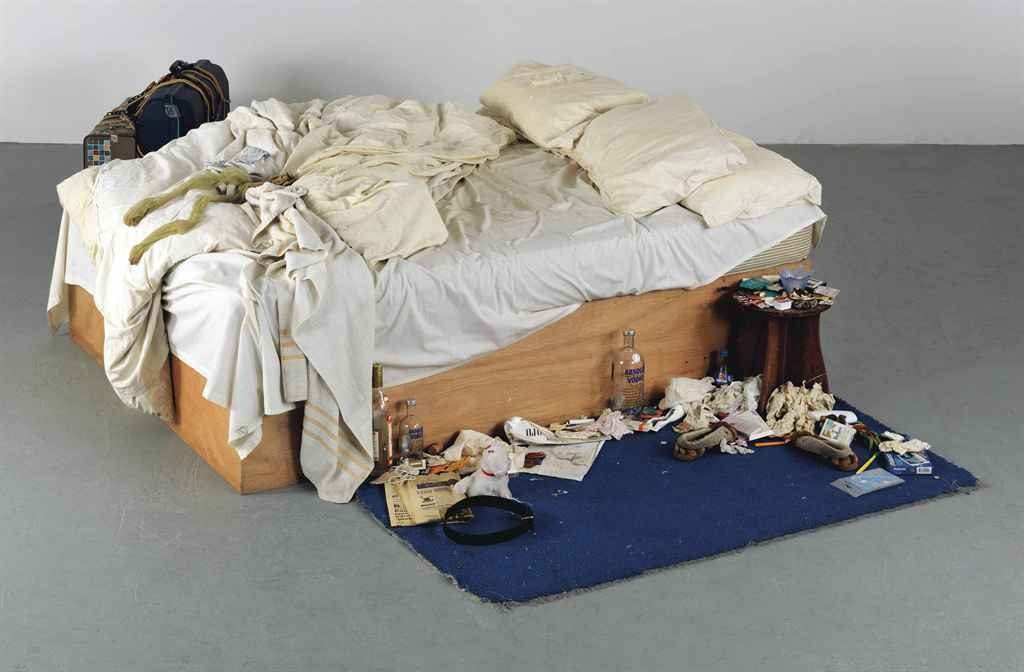Office Day
By Sarah Rose Etter - Apr 10, 2017

It becomes treacherous, the day. The woman next to me slowly removes her ears, one by one. The man in front of me slides new eyes over the old. Me, I do it different: I put a mask over my face at different moments to confuse the situation.
A single plant succeeds here, eleven erect fronds. In the elevator, each day, a new horror: A woman bleeds from between the knees, blood kaleidoscopes on the floor. A child vomits next to a discarded piece of electric green chewing gum. A man holds, in his hand, a transparent bag of used diapers.
The arrangement of the desks is disconcerting. Each day, we bide the morning with coffee. Each day, we eat lunch in silence together. Each day, a new co-worker dies. We hold small funerals, thirty-minute rituals.
“She was a good woman.”
“He was a strong man.”
“She worked hard.”
“He ate my lunch.”
We place their bodies in a kind stack against the wall. We leave their clothes on, as required by human resources. We arrange the bodies in such a way as to ensure nothing sexual is going on because that is also required by Ellen, who is also in human resources, and is in fact in charge of human resources.
When Ellen appears, it is as if by some bad summoning. Her hair is a bleached peacock, her ass invisible.
“What has happened here today is devastating. We promise it won’t happen again,” Ellen says. “If you have any questions, don’t hesitate to reach out.”
The suggestion is that, as if trees, we will extend our limbs to Ellen in need, as if Ellen is both the sun and the water and not the executioner. At precisely 3:34PM, the sun begins to set over our city, the buildings silvering up like knives in the flesh of the sky.
What do I do in the evenings? I take off the mask. I stare into the eyes of a man in a photograph. I hum. The humming is based on ancient chants I read about in a book. Lately, my concern has been with wholeness: Am I whole? Should I be completed? What will do the legwork of this completion?
One danger is arriving too early. If we walk too quickly to the office, we may be the first to arrive. This increases the chance of death by approximately 34.5% based on my algorithm.
My other algorithms peel out other facts: Our profit margins are similar to the blade edge of a razor, the free fruit has stopped arriving, the old free fruit is rotting, accumulating flies, a tableau I painted in oils one day in my free time.
I was reprimanded for my actions. The paperwork says: Conducted non-work related art during work hours. Conduct unbecoming of employee. followed by Ellen’s signature and then her invisible ass walking away from me, the confiscated painting in hand.
I come to work late for this reason. I have found many ways to make this happen: Dropping an entire hot coffee on myself, petting someone else’s dog, singing an opera in its entirety before stepping through the glass doors and onto the elevator which will contain yet another new horror, perhaps a woman giving live birth, her screams trapped with us in the dirty silver of the machine. The child will not be named after me.
Ellen spends her evenings differently. Here is how Ellen is: She drives home from work in a small red car, the smallest red car, a square red car with small wheels. In certain weather, the car is a hazard. Let’s say it is a sunny day. She drives her red car under the sun to a small empty home.
She opens the front door and dozens of small birds fly to her, feathers fucking up the air, the scent of uncleaned bird shit wafting everywhere. Ellen smiles as they land upon her shoulders and arms, as they bring their beaks to her mouth, as they peck at the strain of her thin lips.
Then she moves into the kitchen. She removes, from the freezer, four different flavors of diet frozen dinners. She slides them from their cardboard boxes, then removes their flimsy plastic films.
She slides her tongue against the frosty top of each meal. The blast of cold hits her throat, travels down, and hardens, in succession, her nipples from right to left.
The next death is different. I walk slowly to the office one morning. I ride in the elevator where a small dog is eating what appears to be a human bone. I know something is off because I can hear a distinct and desperate wailing.
“Don’t come near it!” they shout.
I come near it.
The body of JT is akimbo on the floor. He is nude, a rope around his neck, a plaster snow around his form. Next to his body, a stack of overdue reports and, scrawled in marker, the phrase: I’m not a nice person.
Ellen drives to us in her small red car. She calls us into the meeting room again.
“I hate to keep meeting like this,” Ellen says. “I am so sorry. If you have any questions or concerns, please don’t hesitate to reach out.”
I am a tree. I have limbs. I reach toward Ellen, heart-heavy, but Ellen is already gone, down the terrible elevator, outside and in her small red car. There is, on the floor, a single bird’s feather. I put on my sorrow mask.
In the absence of Ellen, it is our job to move the bodies. JT was a strong man, a man made of muscle and principle, a man of rigor.
We stand around him and this time, we are silent. The loss of him stings through the chest. I thought I would not cry, and yet I do.
“Who would like to say a few words?” asks a man who is not dead.
“I would,” I say.
Everyone nods as if I am very brave.
“JT was a nice person,” I say. “He was the most beautiful soul in this office. He was better than anyone else here.”
The insult hangs in the air.
“Well, fuck you,” says a man who is not dead. “Really, fuck you.”
We nod and move toward JT. He is heavier than the others. We struggle with him, but eventually, we heave him to the top of the stack. We stand next to each other, sweating, the scent of the bodies flooding our noses, our minds. It is the smell we carry home with us to our families, our lovers, our photographs of the man.
The next day, on my slow walk to work, I purchase a canvas. The scent of the bodies has grown worse, but I am determined. Flies are gathering to the staggering ripeness, small black bits on the skin.
I paint the bodies nude, which requires an imagination as they are clothed. My inspiration here: Caravaggio. I paint them as if candlelit, which also requires imagination beneath the fluorescent glare.
The stench of the bodies builds, becomes an unkillable new person beside me. At 3:34PM, the sun begins to set. I turn off the florescent lights. The light cascades over the bodies of the lost, hues I move quickly to capture. I paint JT at the top, in his glory, the peak gold of the sunlight on his skin.
By the time I am finished, everyone is gone. The office is a quiet coffin. I take off my mask. I go home to the photograph of the man. I hang my painting of the bodies beside, the golden glow of the latest loss illuminating it all: My living room, my kitchen, my upturned face.
***
Sarah Rose Etter is the author of Tongue Party (Caketrain Press). Her work has appeared or is forthcoming in The Collagist, Black Warrior Review, Salt Hill Journal and more. She is a co-founder of the TireFire Reading Series and a contributing editor at The Fanzine.
